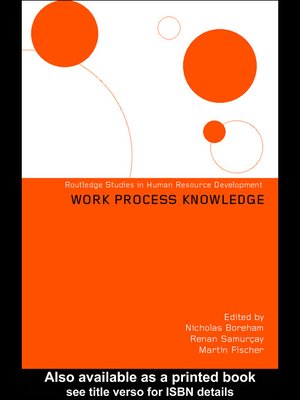
Sign up to save your library
With an OverDrive account, you can save your favorite libraries for at-a-glance information about availability. Find out more about OverDrive accounts.
Find this title in Libby, the library reading app by OverDrive.



Search for a digital library with this title
Title found at these libraries:
| Library Name | Distance |
|---|---|
| Loading... |
Work Process Knowledge brings together the research findings of twenty-four leading researchers on new forms of work and the demands these place on workers' knowledge and skill. Their findings, based on a new set of investigations in a wide range of manufacturing and service industries, identify the kinds of knowledge required to work effectively in the post-Taylorist industrial organization.
Drawing on studies in a number of countries, the volume focuses on the central concept of work process knowledge. This is knowledge which is required for work in flexible situations, which is constructed in the workplace, and which includes an understanding of the work processes in the organization as a whole. The volume contains theoretical accounts of this war of knowing, including innovative ways of researching into it. The book also includes evidence-based guidelines for practitioners responsible for industrial training and facilitating learning in the workplace.
Raising fundamental issues for current industrial policy, science and technology policy, and ways of managing the post-Taylorist organization and developing human resources, this book will be of essential interest to academics and professionals working in the fields of management, human resource development, and workplace learning.
Drawing on studies in a number of countries, the volume focuses on the central concept of work process knowledge. This is knowledge which is required for work in flexible situations, which is constructed in the workplace, and which includes an understanding of the work processes in the organization as a whole. The volume contains theoretical accounts of this war of knowing, including innovative ways of researching into it. The book also includes evidence-based guidelines for practitioners responsible for industrial training and facilitating learning in the workplace.
Raising fundamental issues for current industrial policy, science and technology policy, and ways of managing the post-Taylorist organization and developing human resources, this book will be of essential interest to academics and professionals working in the fields of management, human resource development, and workplace learning.







